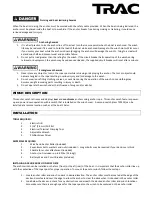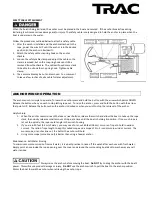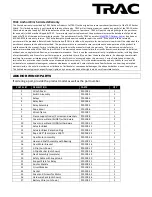
3.
Using a marker, mark the anchor roller and winch mounting holes on the deck. NOTE: There are several bolt
holes in winch frame to choose from. The easiest to use are the four slots (2 on each end of the frame). There
are also holes for the battery lead wires so you can route the wires through the deck if you desire.
4.
Remove winch and anchor roller. Drill the holes. Bolt to deck.
Use fender washers and/or marine plywood under
the deck to ensure the greatest strength and to spread the load
.
WIRING SELECTION & SPECIFICATION
Do not use wire sizes smaller than 14 AWG with 105 degree C rated insulation. Using wire that is insufficient could result in
overloading and a fire. The use of larger diameter wire (small gauge number) is permitted and can improve the flow of
electrical current. If the length of wire that was included with the winch was not long enough, consider acquiring the next
larger wire size (12 AWG) for your installation. Use the supplied circuit breaker or an in-line 20 amp fuse. Using incorrect
circuit breakers may result in a fire.
WIRING
The wires and switch are all properly connected. You will need to route the battery wires from the winch to battery and
connect the RED positive (+) wire to the silver post on the circuit breaker. The small hole on the buss bar (flat stamped metal
part with two holes) is attached to the colored post on the circuit breaker and the large hole on the buss bar is attached to
the battery positive terminal. The BLACK negative (-) wire is attached to the battery negative terminal.
SECOND SWITCH
A second switch may be installed at another location such as the boat’s helm. If this is desired, purchase TRAC item T10115
Second Switch Kit from the store where the winch was purchased, or buy it directly from TRAC on our website, TRAC-
outdoor.com, or call 615-462-6224. The Second Switch Kit includes the membrane switch (same as on the winch housing),
switch panel, mounting screws, and 24’ (7.3m) wire harness with quick-connectors. The wire is routed from the new switch
location to the winch and easily connects with quick-connectors.
WIRELESS REMOTE
As an option, TRAC offers a Wireless Remote for use with this anchor winch. It consists of a wireless remote control (similar
to the key-fob remote for a car) and a control unit that is easily installed to the winch frame under the winch cover. Item
T10116 Wireless Remote Kit can be purchased from the store where the winch was purchased or directly from TRAC on our
website, TRAC-outdoor.com, or call 615-462-6224.
ROPE INSTALLATION
Anchor rope comes pre-installed from the factory, but if you need to install new rope, insert the rope through the hole
located on the inside of the drum (where the rope spools) and tie an overhand knot on the outside of the spool so the knot
can be pulled into the countersunk hole on the outside end of the spool. Pull the rope so the knot is tight against the counter
sunk hole. Make sure the rope is not tangled and not looped around anything and is free to wrap on the spool. Hold tension
of the rope while wearing a glove. Press the UP direction on the switch and hold until the rope is neatly wrapped on the
spool. Release the switch button at anytime during the wrapping of the rope on the spool if an unsatisfactory wrap is
occurring.
The spool will hold as much as 100’ of 1/4” (30.5m x 6.35mm) anchor rope. Use anchor rope with a minimum of 500 pounds
(226.8 kg)
tensile strength. The rope that is installed on the winch is suitable for this winch.
ANCHOR ATTACHMENT
Use an anchor up to a maximum weight of 35 lb. (15.9 kg). Do not exceed this weight or anchor winch damage will occur.
Use a lighter anchor when possible. River or mushroom anchors are preferred for freshwater applications. Attach the
shackle to the anchor shank eye. Tie the rope to the anchor shackle.
The knot must be securely fastened and tested by the user before anchoring.

















